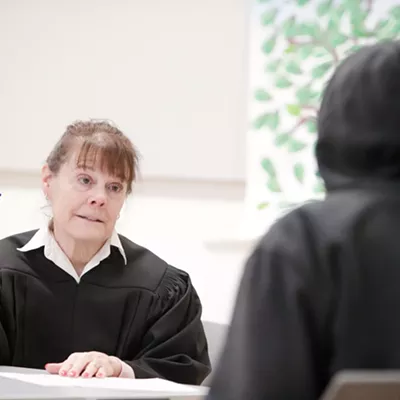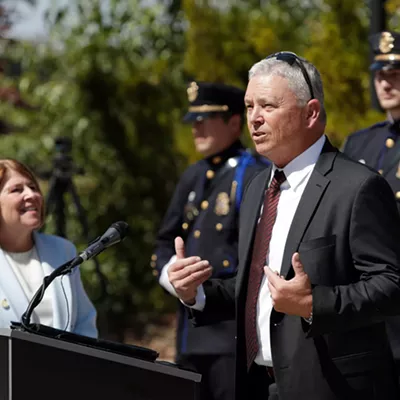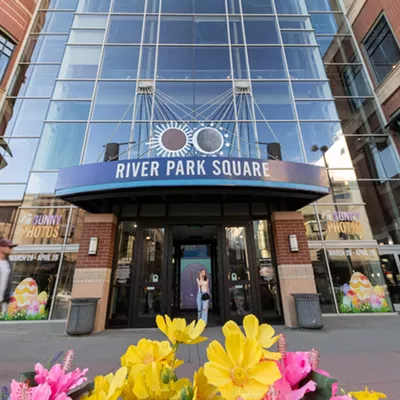
Last Thursday evening, while millions of Americans watched two elderly men argue about golf on TV, about four dozen Spokanites gathered at the Central Library for a community forum featuring the four finalists hoping to become Spokane's next police chief.
Unlike the other big show, the conversation at the library was civil and thoughtful. But some community members say they're still waiting to see if any of the four finalists have what it takes to tackle one of the most important jobs in Spokane.
Mayor Lisa Brown says she's pleased with the quality of the four candidates. She says she plans to continue gathering community feedback based on the forum and hopes to decide which candidate to hire within the next month.
When asked what she wants to see in the new chief, Brown says she's looking for a "leader who has and communicates a vision, but also listens and learns so the vision evolves, and then leads by example when it comes to character and integrity."
The four finalists are The Dalles Police Chief Tom Worthy, Yakima Police Chief Matthew Murray, Memphis Police Col. Kathleen Lanier and Tucson Assistant Police Chief Kevin Hall.
Hall joined the Tucson Police Department in 1992 and was promoted to assistant chief in 2016. He is also commander of the department's Field Services Bureau.
If chosen, Hall promised to be "incredibly accessible."
"Even now as an assistant chief in a very large city, my business cards have my cellphone on them," Hall said. "I want people to call me."
Lanier has 34 years of experience at the Memphis Police Department. She said she's "more of a listener than a talker." If chosen, she hopes to work with the community to identify areas where change is needed.
"It's not going to be easy, and everyone's not going to like it, but we're in a time when we need change in so many different areas," Lanier said.
Murray has worked in law enforcement for 35 years. He spent most of that time in Denver, before leaving in 2019 and being appointed chief of police in Yakima.
In Yakima, Murray said he spent nearly two years walking more than 2,188 miles in uniform to get to know the city on a deeper level and meet community members. He hopes to bring that commitment to community engagement to Spokane.
"In my view, a lot of the challenges that this city faces are identical, just on a much bigger scale than what we're dealing with in Yakima," Murrary said.
Worthy is a Pullman native who spent 29 years with the Oregon State Police before becoming chief of The Dalles Police Department in 2021. Under his leadership, he said community policing would be an "actionable philosophy" that would involve officers getting to know people on a personal level. He's also focused on using technology and data to inform policing decisions.
"I'm under no illusion that we're going to prevent all crime or solve all crime, but we aspire to those highest ideals of policing," Worthy said.
THE SEARCH PROCESS
The position of Spokane police chief was previously held by Craig Meidl, who served as chief for seven years. He announced his plans to retire at the end of 2023 shortly after Brown was elected mayor. Brown appointed Assistant Police Chief Justin Lundgren to fill in as interim chief and established a selection committee to search for a permanent replacement.Worthy said the search for Spokane's next chief has been "undoubtedly one of the most thorough searches for an executive that I've ever witnessed."
The selection committee was led by Deputy City Administrator Maggie Yates, and included Assistant Police Chief Mike McNab, Spokane Police Ombudsman Bart Logue, City Council members Paul Dillon and Michael Cathcart, the heads of the police and fire unions, and members from various community groups.
"They were really united on the candidates they wanted to see," Brown says.
The committee interviewed eight candidates. Some were internal candidates from the Spokane Police Department. Brown says the internal candidates received positive feedback, but the committee ultimately decided to recommend four external candidates.
"I certainly would have been open to an internal candidate if that had been one of the recommendations of the selection committee," Brown says. "But I think you generally benefit from a process of hearing candidates that have had a different experience."
MENTAL HEALTH AND ADDICTION
The candidates all gave similar answers when asked how they would handle homelessness and drug use. They all said police can't be the only answer to the crisis, and that people addicted to drugs need support and services — not necessarily jail time."Mental health and addiction are enormously challenging topics," Murray said. "We are not the experts in that. None of our officers are really experts in that. But we are willing participants."
Police should have a "customer service" approach to law enforcement, Murray said, which means treating people in a way that can help them toward a path to change.
"The guy in the dumpster is a customer," Murray said. "We need to treat people in a way that they feel like a customer."
Worthy stressed that it's not against the law to be homeless or addicted, but that the police department does have a role in policing that population.
The Oregon city of The Dalles (population: about 16,000) has seen success decentralizing homeless services, Worthy said. That means shelters spread across the city with room for 15 to 20 people instead of one central location with hundreds. He said he's also focused on getting people who need help reunited with family members and on arresting people who are bringing drugs into the community.
Hall said addiction is a public health issue, not necessarily a law enforcement issue. He doesn't think cities should allow open-air drug use, but at the same time, "we have to offer a pathway to treatment, or at least treatment engagement." He's a big believer in connecting people with housing to help them get sober in a more stable environment.
"You need to have compassionate policing when you're dealing with populations that are so vulnerable and marginalized like this," Hall said.
Lanier said Memphis has seen success with an overdose response team that works with individuals who have overdosed and tries to convince them to work with police to bring dealers to justice.
"It's about arresting the offender, because it's not a crime to be an addict," Lanier said.
SHOOTINGS AND TRANSPARENCY
The Spokane Police Department ranks among the highest in the nation when it comes to deadly police shootings per capita, according to Mapping Police Violence, a police accountability group. Yates said concern over the frequency of officer-involved shootings was one of the top issues mentioned in community meetings.When asked how she would address that concern, Lanier said police violence is often a training issue. She thinks officers need to be trained in de-escalation, less-lethal munitions and "shoot-don't shoot" scenarios.
"Even when it's justified in the terms of policy and procedure, there's something called 'lawful but awful,'" Lanier said. "We need to address those situations."
Lanier added that it's a two-way street, and that the community should understand that there are times when police will have to shoot people.
Murray stressed that every police shooting is tragic and horrible, but that incidents have to be viewed "in a light that's honest about the situation so that you can make a good determination about how we should move forward as a city."
Murray said he has used strategies from a trip that members of his department took to Scotland to better assess how and when officers should use deadly force.
Worthy said shootings can be prevented by equipping officers with appropriate knowledge before they enter a potentially dangerous situation. Sometimes deadly force is necessary, he said, but when that happens it's critical for departments to share information about what happened with the community as soon as possible.
The ideal number of police shootings is zero, Worthy said. But when they do happen, the department should be "transparent, compassionate and thorough and accurate in our reporting."
There's not a lot police can do when an individual has a firearm and is threatening an officer's life, Hall said. But when a suspect has a knife, bat or other weapon, Hall thinks police can prevent deadly shootings by using less lethal methods.
"Historically, we have trained officers to believe that everybody is trying to harm them, everybody is trying to kill them, everybody is a threat," Hall said. "We really need to take a look at how we can move that training forward and out of the '90s. We're much better than that."
QUESTIONS FROM THE COMMUNITY
After taking a few questions on stage, the four finalists went to separate parts of the room so community members could talk to them and ask questions.Matthew Welde, who is running to represent the 5th Congressional District, asked Murray how he would tackle the issue of missing and murdered indigenous women. Murray replied that he has a lot of experience dealing with the issue in Yakima and that he would work with local tribal police while respecting their sovereignty.
JD Leighty, one of many local police accountability activists who attended the forum, asked Hall about the fact that Spokane has a long track record of police shootings being found justified, and asked what he would do to ensure a truly independent investigative process.
"As long as they're receiving complete, thorough investigations, I think we should all be glad that they've been justified," Hall replied, adding that working with other agencies "brings sunlight to that process."
Reflecting on the forum, Anwar Peace, a longtime police accountability activist who is chair of Spokane's Human Rights Commission, said he hopes the new chief will be willing to engage with the community and take a holistic approach to public safety. That includes better mental health programs for officers, Peace said.
Peace thinks it's good that all four of the finalists come from outside agencies.
"The reason that we're having to get an outside chief is because the leadership inside this department is rotten," Peace said. "We need to try to weed a lot of this stuff out and create a restorative healing process with the police in the community that they serve."
City Council member Jonathan Bingle disagreed. He said he has no problem with outside hires, but "considering how many great options we have locally, I was upset that we didn't have at least one local option make it through."
Of the four candidates, Bingle said he thinks the city will probably end up with someone who will do a fine job. But he wasn't "overly enthused" by any of them, citing concern with some of their responses to questions about homelessness.
Peace is still waiting for more information before making up his mind about the four finalists.
"I've been doing this for 24 years, so some of the answers I've heard over and over," Peace said.
"They're canned answers," Leighty added.
Natasha Hill, a local lawyer and activist who is running to represent Spokane's third legislative district, said after the forum that she hopes the new chief will understand the culture they're entering in Spokane. Trust has been damaged by previous department leaders, she said, and it's important that the new chief is intentional about rebuilding and repairing those relationships.
Leighty said he's glad some of the candidates seemed open to talking about improving transparency, but he's not holding his breath.
"It's going to be very hard to change," Leighty said. ♦























